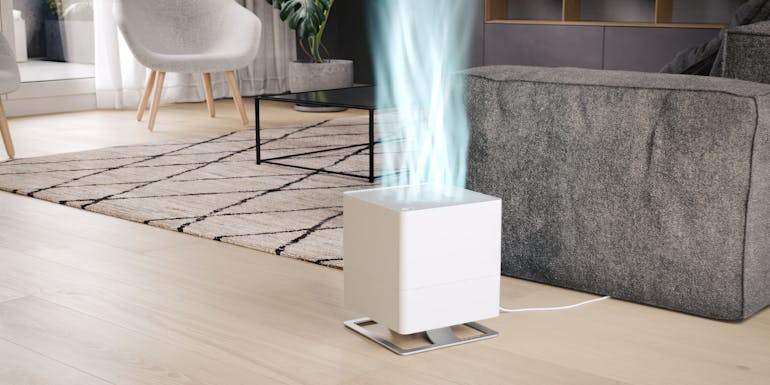
Nadine Walder , 18 September 2024
Humidify the air
How does humidity affect skin care?
Are you no stranger to skin problems and blemishes that are influenced by the season and external factors? Do you often suffer from dry skin in winter and more oily skin in summer? The reasons for this may lie in the temperature and humidity, as the health and appearance of our skin is influenced not least by these two factors. In this article, we explain how humidity in particular affects your skin and how it should influence your skincare regime.
Read on to find out:
- Factors that influence the skin and skin care
- Relationship between skin and humidity
- Skin care for high humidity in summer
- Low humidity: dry skin in winter
- Skin moisture: Ideal indoor climate for healthy skin all year round
Factors that influence the skin and skin care
The skin and its appearance are influenced by various factors. A basic distinction is made between internal and external influences. Internal factors include genes, hormonal balance and natural skin ageing. Genes can play a role in the development of neurodermatitis, for example, and skin prone to extreme dryness can also be hereditary. The appearance of the skin also interacts with our hormonal balance and is subject to its fluctuations, which women in particular often notice. If the hormonal balance becomes imbalanced, pimples, blackheads and the like can develop. Finally, the natural ageing process also plays a key role in the appearance of our skin and how we optimise our skin care.
External influences on the skin and its appearance include free radicals (metabolic products that are very aggressive and can attack healthy cells), environmental pollution and UV radiation. These three factors contribute significantly to skin ageing, can impair the skin's appearance and favour or exacerbate problems such as acne or dry skin. Another often underestimated but decisive external factor is the relative humidity. It plays a key role in the skin's moisture content. Depending on the time of year and climatic conditions, humidity can pose different challenges for skin appearance, skin health and skin care.
Relationship between skin and humidity
Humidity plays a key role in regulating skin moisture. It influences the hydration of the skin, transepidermal water loss (TEWL) – a process in which water evaporates from the skin's surface into the environment –, the skin's moisture balance, the function of the skin barrier and how the skin feels in general.
A study from 2016 shows through a comprehensive literature review that epidemiological findings indicate that skin eczema, such as atopic dermatitis, increases with low humidity indoors. The study also indicates that the symptoms of dry skin occur more frequently at low humidity levels in air-conditioned indoor spaces. The results of the literature review also show that studies with mice have found that low humidity can cause a number of skin changes, including impairment of the desquamation process. Another study emphasises the link between low humidity and skin problems: Low humidity combined with low temperatures lead to a decrease in skin barrier function, increased susceptibility to mechanical stress and exacerbation of dermatitis.
High humidity can lead to excess moisture and thus to problems such as oily skin or acne. The excess moisture mixes with sebum and dead skin cells and clogs the pores. Excessive humidity can also make the skin feel sticky and clammy. Fungal infections can also be a consequence of high relative humidity. Skin irritation and allergic reactions are further effects of excessive humidity. Sensitivity, redness and itching can develop or increase, especially in people with sensitive skin.
For the skin to cope with different levels of humidity, it is crucial to adapt the skincare regime to the respective environmental conditions. Whether it's summer or winter, it's important to adapt your skincare regime to the humidity in order to achieve optimum results, strengthen the skin barrier and keep the skin healthy.
Skin care for high humidity in summer
In summer, the humidity indoors and outdoors is usually high. The skin can then produce an excessive amount of sebum, which can clog the pores and lead to blemishes. In the hotter months, it is advisable to choose lighter products and those that do not clog the pores. The skin should be cleansed daily with non-comedogenic cleanser. A 2-phase cleansing is recommended. In the first phase, you first do an oil-based cleansing and then use a foam or cream cleanser. It is also important to moisturise the skin sufficiently, even in high humidity. To do this, use creams that are oil-free, light and pore-friendly for your skin type. Moisturising ingredients such as glycerine and hyaluronic acid are beneficial. On the other hand, creams that are heavy or occlusive (protective layer-forming) products should be avoided. Heavy make-up should also be avoided in humid climates, as it can melt and further clog the pores. Regardless of the weather, you should also apply sun protection every day.
In addition to these specific recommendations, there are several other measures that will help to support your skin health. These include drinking enough water, wearing breathable clothing and maintaining a healthy lifestyle in general.
Low humidity: dry skin in winter
Especially in heated rooms, the humidity often drops sharply in winter, which can dry out the skin. This can lead to redness, feelings of tightness and even eczema or worsen existing symptoms. In these conditions, you should rely on rich moisturisers and oils that strengthen the skin barrier and optimally lock in moisture (occlusive products). Use rich moisturisers with moisturising ingredients such as glycerin, ceramides and hyaluronic acid. You should apply these immediately after cleansing when the skin is still damp. You can also supplement your skincare routine with a moisturising serum. It is also advisable to exfoliate at least once a week to remove dead skin cells from the skin's surface. Chemical peels such as fruit acid peels are suitable here. Don't forget to use sun protection in winter too, as UV rays can damage the skin all year round. To keep your body and skin moisturised, you should drink plenty of water, just like in the hot months. A balanced diet with plenty of vitamins and antioxidants also supports skin health in the winter months.
Skin moisture: Ideal indoor climate for healthy skin all year round
To keep your skin healthy all year round, you can not only adapt your skincare to the respective conditions, but also optimise your indoor climate accordingly. A relative humidity of 40 % to 60 % is recommended indoors.
In the winter months, when the humidity indoors drops significantly due to the heating, a humidifier can help you to achieve and maintain the ideal humidity level. Humidifiers release moisture into the room air and can therefore prevent the skin from losing moisture and drying out. A humidifier is a sensible investment, especially for sensitive skin or skin prone to dryness. In air-conditioned rooms, the air is often too dry, which is why a humidifier can also be helpful in summer.
In environments with high humidity, on the other hand, a dehumidifier can be useful to support skin health. These reduce the humidity in the room and help to create a healthy skin climate.
In addition and depending on the climatic conditions, air purifiers and air washers can also be helpful in improving skin health. These devices filter pollutants, pollen and other particles from the air that can irritate the skin. For people with sensitive or allergy-prone skin, the use of an air purifier or air washer can be useful and very beneficial.
Do you want to know more about humidity and what the difference is between absolute and relative humidity?
If you have questions related to indoor room climate, please get in touch with us. Or subscribe to our newsletter to regularly get informed about current topics regarding indoor climate, experience reports or Stadler Form insights.



















